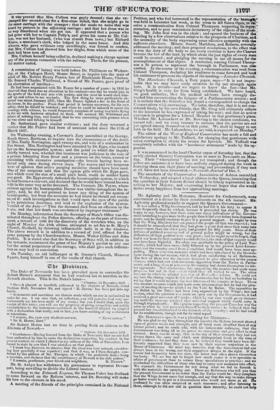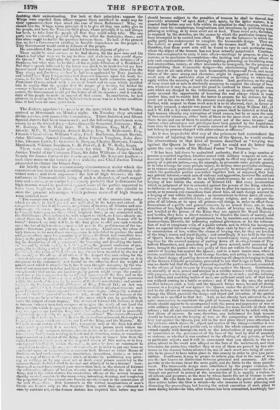Mr. Aglionby and Mr. Horsman, Members for Cockermouth, we entertained
at a dinner by their constituents on the 4th instant. Mr..' Aglionby professed anxiety to support the Queen's Government— • •
It was called a Whig, Government, amid he had felt it his duty to oppose it more frequently than he wished, because it proceeded too slowly. Ile' was' happy to say, however, that there were now many indications of the Govern,' ment intending to give more to the people than it had ever before been disposed to grant, mud he should continue to give it a general support. It might be true - that th W e hig Ministers had not 'granted the people all that was expected ; but it should be remembered that they had given a great deal since they came into power—more than the other party had granted Mr fifty years. Some of their notions of political economy and of general policy might be wrong, but the difficulties of their position were very great ; and we ought never to forget, that had it not been for their conduct towards lreland, the state of that country would now have been frightfal. Its sakty was ascribable to the policy of Lord Nor, manhy, which had been same:: fdly followed up by the present Lord-Liente.s. mint, and the country- canal from a condition that would have been most ap- palling. There were two measures whirls had been introduced by the Govern- ment during the last session, which had given satisfaction to all Reformers.. The first of' these NVati tlIC trie,i,are designed to give education to-tbe poorer ibsses ; which bad met with inv,qerate opposition from the Tories in Parliar and a large el.iss of pQrs.,Ls in the country had shown themselves its bit-. ter (.pptments. Not withsteediag this opposition, the measure had made some progr,ss, but not to that HT s hich they all wislad to see. The other mem-ttre to which he alluded as it of Po.t-rdlire reform. He could not say how the change might be folt iii C.,ekermeoth, but Le had no hesitation in saying that it would advance time Imc,t interest of the country at large. There was another measure which had made sonic progress since last he had the plea- sure of meeting them—he alluded to the Vote by Ballot. The opposition to the Ballot by the Tories had been long augmented by the Whigs; but last session, when the question was made au °pea name by the Government, it had received a great accession of f. iends ; which he was sure would go on increas- ing until the MCaRITC received that universal support which would carry it through. tripumhantly. His opinion respect the present Corn-law WAS the same as when he tirst presented himself to their notice : he believed that the present law was detrimental to the interests of the country; and he had voted for its modification, though not for its total repeal.
Mr. Horsimeis speech was a pleading for Ministers— He was glad to say that throughout the country the Reform interest showed signs of greater union and strength, and of being more steadfast than at any former period ; and he could add, with his honourable colleague, that the Government was doing all in its power to consolidate and give ...Get to that interest. Sorry was he to say, that in the day of their strength they had not always Shown the same zeal which now distinguished them in the time of their weakness; for had they dune so, he believed they would have been dif- ferently supported than they were now by their narrow majorities in the House of Commons. He must say, however, that the Government had not always been in the wrong, nor their supporters always in the right. If the former had frequently been too slow, the latter had often shown themselves too hasty. We are too apt to forget how mach easier it is to speculate in affairs of government than to reduce those speculations to practice ; and we overlooked the difficulties of those who had to carry new measures into effect. We reproach the Government for not doing what we fail to furnish it with the materials for carrying out. There are Reformers who tell you that the present Government is no better than the Tories would be: they complain that the Whigs do not move fast enough, and say that the way to make thing go faster would be to put in a Government who would not move at all.
confessed he was often surprised at such reasoners ; and after liatening to them, although he did not call in question their sincerity, he could not help
doubting their understanding. . For look at their principles : suppose the Whigs were expelled from office—suppose them sacrificed to make way for their opponents—how then stood the ease of these Reformers? Why, we sliould lose the Whigs, 14-1108e principle it is to give all they can safely glve to thepeople, and have the Tories in their place, whose principle it is, and always has been, to take from the people all that they could safely take. The one party was for extending popular rights, the sake for destroying them; and this alone ought to decide the question between them. To look at the present day, we hail a Government existing in humble dependence on the people; a Tory Government would exist in defiance of the people. He considered the poor and misled Chartists objects of pity— There might be some exemie, as he had shown, for the poor man and his Charter, but what were we to say to those rich declaimers who would depose the Queen ? We might pity the poor man led away by the delusions of a Stephens, hat what were we to think of the regicide followers of a Bradshaw? Not that a speech delivered be the latter wee much to be heeded—hut see how Its sentiment, had run through his putty; see how he had been cheered by the Tory cler,,,v and .Tinitices; see howhe had been applauded by Tory journals; and.heholehow Tory Corprations lied showered honours upon his head, be- cause, in his love for Prot. etanii,:1), ID, had poured forth calumnies against a Protestant Queen, mixed with roi iu of insult and treeson which justified him in saving that the speaker 11d the tongue of' a (rd w', hut lacked the cworage 1,•-become a rebel. (Trern..;,.! us cheeriav.) By a safe amid, temperate course, the Government at tild get the better of all its enemies ; and it was the duty of the people to unite in support of that course. In conclusion, be had pleasure in assuring them tint lie believed their cause was in a better condition than it had been for SUIllt; y,tirs back.



























 Previous page
Previous page